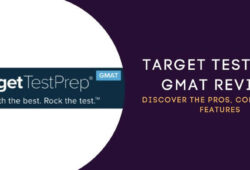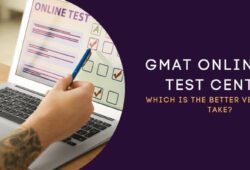The GMAT Focus Edition no longer features the IR section, sentence correction, or analytical writing, but many core components remain similar more or less.
Even though the new test version is now shorter and even takes a shorter time to complete, do not make the mistake of underestimating how much effort is still required to efficiently prepare for the GMAT.
Considering that this is unlike any other standardized test you may have encountered before, learning how to study for the GMAT is a unique skill in itself.
Quick Summary
- Getting a good GMAT score requires solid math knowledge, critical, analytical, and logical reasoning skills, and good reading comprehension skills,
- The free GMAT official starter kit + practice test 1&2 is the perfect introduction to the test and will help guide the rest of your GMAT prep.
- To get the best score you possibly can on this test, you are going to need to learn to think like the test writer and seek out the ‘GMAT essence’ in each practice question you encounter.
- For the quant section, study wide and deep. Although the GMAT does not cover any advanced topics, the material applicable to a solution may be broader than you think i.e. formulas, number properties, etc.
What Does The GMAT Test?
The GMAT primarily tests your problem-solving, critical thinking, and analytical skills, and the ability to apply these skills quickly, under timed conditions.
How well can you reason and make complex judgments almost in a split second? That’s what the GMAT is designed to measure.
To understand how these skills are tested, you will need to familiarize yourself with the structure of the GMAT exam.
The GMAT Focus Edition consists of 3 sections:
- Quantitative Reasoning
- Verbal Reasoning
- Data Insights
a) Quantitative Reasoning
This section measures your arithmetic and algebraic foundational knowledge, as well as how you apply this knowledge to solve problems.
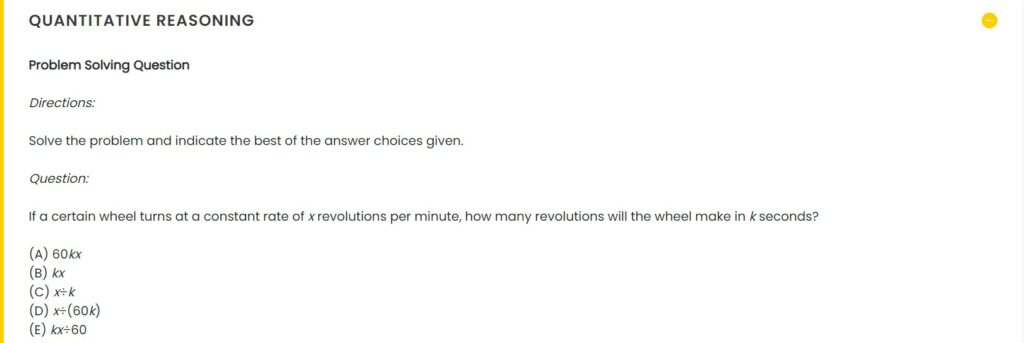
The math tested in these problem-solving questions is not too complex. You just need sufficient knowledge of arithmetic and elementary algebra.
Furthermore, beyond these basic math skills, the main focus of this quantitative section is to test your logic and analytical skills.
b) Verbal Reasoning
This section tests your ability to read and comprehend written material, as well as measure how well you can reason and evaluate arguments.
You are presented with Reading Comprehension and Critical Reasoning questions.
Reading Comprehension questions are meant to test the following reading skills: main idea, supporting idea, inference, application, logical structure, and style.
These questions measure your ability to:
- Understand words and statements
- Understand logical relationships between significant points
- Draw inferences
- Follow the development of quantitative concepts.
Critical Reasoning questions are meant to measure your ability to make and evaluate arguments, as well as formulate or evaluate a plan of action.
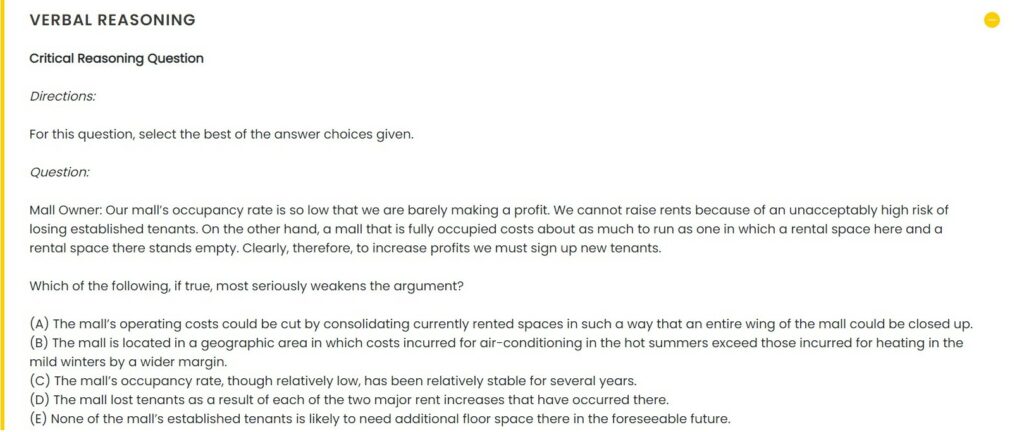
You are presented with a short reading passage, of about 100 words, which is then followed by questions. You are not required to possess any specialized knowledge in order to tackle the critical reasoning questions,
Rather these questions may typically require you to identify which of the five answer choices:
- Weakens or strengthens the argument
- Explains why the argument is flawed
- Strongly supports or damages the argument
c) Data Insights
This section measures your ability to analyze and interpret data and apply this data to real-world business scenarios.
Your knowledge in digital and data literacy will be tested as well.
Here, your math, data analysis, and verbal reasoning abilities are put to the test, through a variety of question types including:
- Data Sufficiency Questions
These measure your ability to analyze a quantitative problem, recognize which data is relevant, and determine at what point there is enough data to solve the problem.
- Multi-Source Reasoning Questions
These measure your ability to examine data from multiple sources, analyzing each source of data carefully to answer multiple questions.
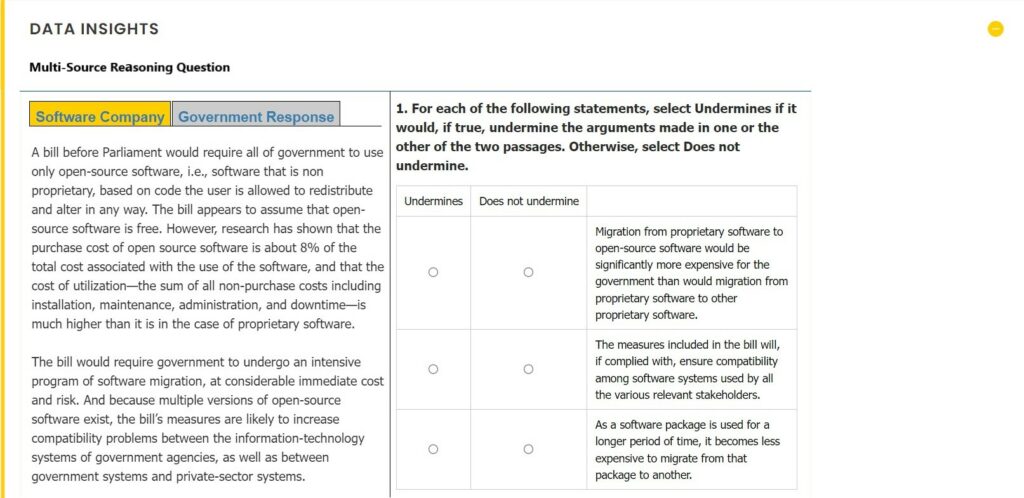
These data sources in question comprise text passages, tables, and graphs.
- Table Analysis Questions
These measure your ability to sort and analyze a table of data, to determine what information is relevant or meets certain conditions.
The table of data presented is similar to a spreadsheet.
- Graphics Interpretation Questions
These measure your ability to interpret the information presented in a graph or other graphical image, in order to discern relationships and make inferences.
The graphical images may include scatter plots, x/y graphs, bar charts, pie charts, or statistical curve distribution.
- Two-Part Analysis Questions
These measure your ability to solve complex problems of a quantitative or verbal nature, or even some combination of both.
The skills tested here include your ability to evaluate trade-offs, solve simultaneous equations, and discern relationships between two entities.
What Is The GMAT Test Like?
Regulated by the Graduate Management Admission Council, the GMAT is not like most standardized tests you may have come across.
Administration
The GMAT can be taken pretty much every single day of the year, and test takers can sit for the exam online, or in person at a testing center.
This is a proctored test that lasts about 2.5 hours if you factor in the optional 10-minute break.
Computer-Adaptivity
The GMAT is a computer-adaptive test which means that throughout the exam, the difficulty level of the questions adapts successively based on your responses.
Your abilities are estimated successively, based on your responses to the questions administered, which means that each question is tailored to your current ability estimate based on the accuracy of your responses.
Format
You are given 2 hours and 15 minutes to answer the 64 questions presented in the GMAT exam, and the 3 GMAT sections are all weighted equally towards your total score.
GMAT Section | No. Of Questions | Timing | Score Range |
Quantitative Reasoning | 21 Qns. | 45 Min. | 60 - 90 |
Verbal Reasoning | 23 Qns. | 45 Min. | 60 - 90 |
Data Insights | 20 Qns. | 45 Min. | 60 - 90 |
Entire GMAT Exam | 64 Qns. | 2 Hrs. 15 Min | 205 - 805 |
On test day, these sections can be answered in any order of your choosing.
Just as well, the 10-minute break can be taken whenever you choose, either after the first section or after the second.
This means that you can have a personalized testing experience, allowing you to tackle the GMAT exactly how you prepared for it.
Types Of Questions
There is very little memorization or specific content knowledge involved in studying for the GMAT.
Instead, the GMAT is a reasoning test that specifically assesses your quantitative reasoning, verbal reasoning, and data insights.
The types of questions you should expect to encounter on the GMAT include:
- Problem-solving questions
- Reading comprehension questions
- Critical reasoning questions
- Data sufficiency questions
- Multi-source reasoning questions
- Table analysis questions
- Graphics interpretation questions
- Two-part analysis questions
The GMAT penalizes you for leaving questions unanswered, so you may want to be wary of this and ensure you attempt all the questions on the test.
What’s The Best Way To Study For The GMAT?
The best way to prepare for the GMAT will depend on your learning style, your budget, and how much time you can devote to your exam prep.
Here’s a course of action that could help you make a GMAT study plan that best suits you:
Step 1: Start off with a diagnostic practice test.
This will help you establish a baseline score, so you can gauge how well you understand the GMAT content, as well as identify where your strengths and weak areas may lie.
Based on your baseline, and how far you are from your target score, you can then estimate how much help you will need with your GMAT studies, as well as how much prep time you might need.
Step 2: Explore the official GMAT prep resources.
The GMAC has ensured that there are plenty of official GMAT prep resources at your disposal, and some are even free!
The free official GMAT prep resources from GMAC include 70 practice questions, and two free practice exams complete with GMAT scores that align with the real GMAT exam scoring.
Just as well, take your time to go through the GMAT Official Guide, OG to know the test and learn the exam’s sections.
Step 3: Gather your third-party study resources.
Whether it is signing up for an online course such as Manhattan Prep or Target Test Prep, or getting a tutor, go ahead and select the study resources that may best suit you.
Whichever study materials you end up with, ensure you get good coverage of the fundamentals i.e,
- Learn the basic concepts in algebra and arithmetics.
- Familiarize yourself with the grammar rules.
- Brush up on your general reading comprehension.
- Polish up your critical reasoning skills.
- Learn how the different GMAT problem types work.
Step 4: Map out a study schedule.
Create a general timetable with some of the major milestones you want to work toward.

Your study plan should be thorough, yet achievable, and realistic based on your starting point and how much study time you can carve out of your day.
A few aspects you should aim for in your study schedule include:
- Comprehensively cover the fundamentals.
- Take advantage of timed practice tests to work on your strategies and practice time management.
- Thoroughly analyze and review tests to accurately gauge your progress.
- Take the official practice exams to get a good indication of what final score you might get on exam day.
Step 5: Consider finding a GMAT buddy or community.
An external source of accountability will prove helpful in keeping you on track, and helping take a lot of guesswork out of your GMAT prep.
Besides making the process more fun and less isolated for you, a fellow test taker can offer new perspectives on study methods and ideas, helping to sharpen your GMAT skills in the process.
Is It Necessary To Take A GMAT Prep Course?
Although taking a GMAT prep course isn’t mandatory, plenty of students have sworn by these courses, claiming that they played a huge role in the high GMAT scores that showed up on their official score reports.
Advantages of taking a GMAT prep course include:
- You get a comprehensively structured study plan.
- Expert guidance from experienced GMAT tutors.
- A well-laid-out curriculum covering all the necessary topics and skills tested on the exam.
- Expert guidance for business school admissions process.
- You get plenty of proven strategies and techniques for approaching different question types on the GMAT
- Access to a wide range of practice materials.
- Access to performance tracking and assessment tools.
- You get valuable feedback on your strengths and weaknesses.
- Peer interaction and support throughout your GMAT journey.
All in all, GMAT prep courses help to optimize your study time and increase your chances of a high score since you aren’t groping in the dark.
When Should You Start Studying For The GMAT?
The ideal timing for when you should start studying for the GMAT can vary from one test taker to another, depending on factors such as:
- Your familiarity with the content.
- How far your target score is from your baseline score.
- How much study time you can realistically dedicate to your GMAT prep.
- The application deadlines of the business schools you plan to apply to.
The rule of thumb is to start your GMAT prep early enough so that there is enough time to receive your scores and incorporate them into your applications, or even allow sufficient time for a retake if need be.
In this case, attempt to sit for the exam at least one year before the application deadline of your university of choice.
At the same time, keep in mind that the GMAT is a challenging exam and it can take a considerable amount of time to rewire your brain and acquire the necessary skills required for GMAT success.
It is generally recommended that you allocate about 2 – 3 months of consistent study time to your GMAT preparation.
Strategies To Ace The GMAT
- Deeply analyze each practice question.
Whether it’s the verbal section or the quant section, rather than plowing through hundreds and hundreds of practice questions, slow down a bit.
Take your time to deeply analyze each problem you tackle, by asking yourself the following:
- Why is the wrong answer wrong?
- Why was I tempted by the incorrect answer? Why did I think it was (or could be) right?
- Why is the right answer right?
- Why did I think the correct answer was wrong? Why did I think it was (or could be) wrong?
The GMAT isn’t necessarily hard, but it is tricky, which means that it can be easy to misread or misinterpret the meaning of a sentence.
Understanding how the test writers may have trapped you in one question, will help prevent such pitfalls moving forward.
- Know when to make an educated guess.
Learning how to guess efficiently on the GMAT will help save time and even earn your points.
However, making educated guesses is highly preferable to blindly guessing because the former increases your chances of guessing the question correctly.
A few guidelines to help you know when to make an educated guess include:
- Can you eliminate any obviously incorrect answers?
- How much time do you have left in that section? Can you skip the question and come back to review it?
- Is the question tough, tricky, or tedious, hence worth guessing rather than working on it?
- Pace yourself.
Right from studying for the test to taking the actual exam, one thing you need to keep in mind is that the GMAT is a marathon, not a sprint.
A few pacing tips you could use include:
- Practice to the point where you don’t need to keep re-reading the question prompts.
- Develop efficient strategic frameworks for approaching and solving the different GMAT question types.
- Boost your reading precision.
- Know when to skip or make an educated guess.
- Develop an internal clock.
- Benchmark your timing wholly. For instance, allocate 13 minutes to answering every 7 questions, rather than allocating 2 minutes to each question.
FAQs About How To Study For The GMAT
How Long Should I Study For The GMAT?
It is recommended you take about 3 months to consistently study for the GMAT.
That being said though, it is hard to conclusively determine how one should study for the GMAT because there are several factors involved.
While some test takers knock it out of the park after just a month of studying, others may need up to 6 months before they are sufficiently equipped to face this test.
Should I Focus On Specific GMAT Sections More Than Others?
Not really, no.
When preparing for the GMAT, you should spend a fair amount of time on each section of the test, regularly reviewing both your strengths and weaknesses lest you end up making careless errors as a result of being complacent in your strong areas.
What Are Some Beginner Tips On How To Start Studying For The GMAT?
- Don’t underestimate the amount of effort it will take to prepare for the GMAT.
- Take a diagnostic mock exam to establish your starting point.
- Familiarize yourself with the official guide, OG.
- Develop efficient methodologies and learn a strategy for each question type.
- Take a practice test every 7 days, allowing yourself sufficient time for review and analysis.
- Keep an error log for the types of questions you are getting wrong and why you keep missing them.
How Long Do You Need To Study For GMAT To Get 700?
If you are aiming for a 700 on the GMAT, which is equivalent to a 655 on theFocus Edition, you will likely need to put in no less than 4 months of consistent study time.


